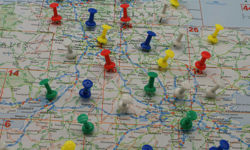
Think back to 2005. In so many ways, it seems like a lifetime ago. And yet it also feels like only yesterday.
Now take a moment to reflect on all the ways our industry, and the world, has changed since then. Technologies we now rely on did not exist – our concentration spans were longer. The thought of Donald Trump as a president would have been laughable (and still is, some might say).
No one had heard the awful phrase ‘fake news’ and we mostly still consumed it in print or broadcast.
That year – 2005 – was the year I first stepped into a newsroom, having just left school.
It was HUGE. People as far as the eye could see, phones ringing off the hook, a stressed-out editor shouting at a reporter – what a place! There was nowhere else like it. I was terrified and at the same time, I was home. I loved it – even if everyone ignored me (apart from when I was bringing them tea) or sighed when asked questions as they tapped away on their cumbersome keyboards.
A calling
Corny as it sounds, I always wanted to be a journalist. Any journalist worth their salt always wanted to be one.
We all have similar stories of reading the newspaper as children, writing our own using coloured paper and crayons, taping tunes from the radio and making our own broadcasts.
We want to make a difference.
This is the only reason, in my experience, one should become a journalist.
A career in journalism gives you access to incredible experiences. From meeting royalty, to training with the army, to going on police raids, to dining at the finest. Yes, most days are horrendously long and most days don’t end in a meal at a Michelin-starred restaurant… but some days do! And you’ll get paid less than all your mates for the privilege of those rare occasions.
But these experiences aren’t the things you will remember. You will remember how you made someone feel – how you saved an elderly lady from being turfed out of her home, or you salvaged someone’s business, or helped stop an asylum seeker from being deported, or raised thousands of pounds for a good cause.
Because journalism is never about you. You are there to serve.
Under-appreciated
The best journalists get this. By and large, you will find them in local newsrooms. They are the community stalwarts – the ones who have an encyclopaedic knowledge of their town, the ones who will shout the answer to a random question, like ‘what’s the area code for X village?’ or ‘what year did Jones the Butcher close down?’ across the office.
They toil away on weekends, evenings, Christmases. They are in love with what they do.
People working in local newsrooms are the opposite of the callous, blood-hungry stereotype. They are caring, dedicated and of good moral standing.
They need to be looked after and appreciated.
Not just by the public – who really have no idea what an asset they have if they have a local newspaper – but by their bosses.
The prestige of journalism has long since faded away; we can no longer get away with paying less than other industries or making people feel like they have to sacrifice their lives to this job because they’re ‘lucky’ to have it.
We need to stop taking advantage of their passion and willingness to serve.
We know journalists have an emotional connection with their newsrooms; these are the places we experience pivotal moments in our lives.
I met my husband in the newsroom – lots of people meet their spouses in the newsroom. You bond over your shared experiences of being shouted at, caffeine addiction and ability to stomach cheap alcohol (no one can party like a journalist).
If you’re a journalist, think back to all the major world events – I bet for most of them, you were in the newsroom. Pulling all-nighters for elections; Brexit referendum; royal weddings… celebrity deaths, terror attacks and, most recently, coronavirus.
Thanks to Covid speeding up the inevitable, newsrooms in their physical form are going extinct.
The end of the newsroom?
As the editor of the Oxford Mail, my team and I crowded around the TV to watch the first wave of people being brought back from China to Brize Norton. In that moment, each of us knew things would never be the same again. Not just for our way of life – which was changed dramatically a few weeks later – but for journalism.
Thanks to Covid speeding up the inevitable, newsrooms in their physical form are going extinct. And that’s not necessarily a bad thing – because technology allows us to work remotely.
Editors across the country are sending newspapers to press from makeshift desks in the form of kitchen tables, bedside cabinets and even ironing boards.
Pre-Covid, the thought of sustaining a 24/7 news service without a physical newsroom sounded bizarre. That we managed to do it – and excel – is something we should be proud of.
Future journalists won’t have the experience of the stained carpets and piles of yellowing newspapers. And for that, I both congratulate and commiserate with them.
The Oxford Mail is currently still in the same purpose-built office from 1972. Yes, it’s the original carpet (it’s pretty much the only thing which hasn’t changed during the entirety of my career).
Also lurking in every corner are the long shadows of what once was. Empty desks, echoey corridors, photos on the walls from past endeavours. Editors who don’t look like me.
Holding on to the ‘way things used to be done’ will never get us to where we need to be.
Misplaced nostalgia
There are those who see this as a great shame; they cling onto the good old days and berate those still in the trenches.
But one could argue that journalists today are more dynamic, adaptable and in-tune with their communities than any generation which came before them.
And so, one of the lessons I will spout to any former journalist who will listen is – don’t be an ‘in the good old days’ bore.
When I took over at Berkshire and Buckinghamshire (I was the first female editor in the 160-year history of the Bucks Free Press), a couple of former journalists took issue with me.
I never met these people – despite my many invitations for them to come in and see a modern-day news operation. They would send me nasty emails telling me what a terrible job I was doing (circulation was up, the websites were growing rapidly, I was named Editor of the Year, but sure).
One cut up an entire issue of the BFP and sent it in the post. It’s both baffling and bemusing that someone would take the time and effort to; buy a copy of a newspaper, find a box, cut up the newspaper, put it in the box, tape the box securely, take it to the post office, queue and pay to send it to me.
I believe he had been an assistant picture editor or an in-putter on a weekly paper, long before I was born. At the time of his campaign of attempted bullying, I was editing seven papers and two magazines. I also had websites. And a team that was less than half the size of ‘back in the good old days’.
As the saying goes, if you don’t like the heat, get out of the kitchen – but don’t then assume you can tell the chef how to cook when they’re working with ingredients you’ve never heard of.
I find abuse of journalists abhorrent – it’s something I am working with a government department to tackle. But when it comes from those who were once in the newsroom, it makes my blood boil.
The editor’s chair is the chair for a white, middle-class, middle-aged man. That is still, in 2021, the assumption.
Need for diversity
Part of the issue is that our industry is still lacking diversity.
The editor’s chair is the chair for a white, middle-class, middle-aged man. That is still, in 2021, the assumption.
I lost count of the number of times someone asked me if they could speak to the editor, assuming it was a man. Or mistook my male deputy for the boss whilst referring to me as his assistant. Or emailed me addressing me as ‘Sir.’ Or made comments about my appearance. Or refused to take my answer as the final one.
My experience is not unique; evidence in the survey of journalists I conducted shows women fare worse than men when it comes to abuse. And for those who are BAME or non-British, it is even worse.
We need to be radical in our policies of inclusion and diversity. If anything, this makes business sense. If we don’t have diversity in our newsrooms, we can’t represent our communities properly. We lose touch with our towns and cities, we become irrelevant – we lose revenue.
And the answer to any form of ignorance, misogyny, racism or discrimination is not, ‘well things were different in those days; people are used to seeing a certain type of person in charge’.
The answer is education, standing up to hate and creating inclusive atmospheres in our newsrooms for all.
It’s no good to be rattling round with the ghosts of the past. Especially when you are trying to create something new and dynamic. Holding on to the ‘way things used to be done’ will never get us to where we need to be. Sometimes, radical change is the only option.
And whilst change has been huge and wholesale during my time in the newsroom, I would ask you this – how much of it has been directed by publishers themselves? Are we leading and innovating and deciding on the direction of travel, or are we passengers? Are we in the driver’s seat, or are we simply reacting?
The answer is education, standing up to hate and creating inclusive atmospheres in our newsrooms for all.
This article was first published in InPublishing magazine. If you would like to be added to the free mailing list, please register here.












